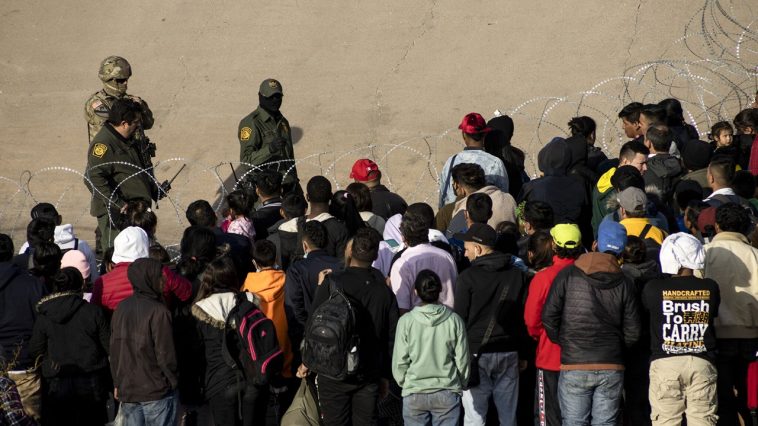LISTEN HERE:
Texas has introduced a new bill that could soon set up a task force made up of civilians with the power to detain, apprehend, or arrest people who unlawfully cross the Texas-Mexico border. The proposed unit, called the Texas border force, could include people with prior military experience, like national guards or previous border patrol agents, among its members. The bill seeks to create a border protection unit that would deter migrants from entering Texas unlawfully using non-deadly force.
The author of the bill, Republican state representative Matt Schaefer, has said that strict measures are necessary. The bill would enable some members of the force to be granted immunity from prosecution for their actions. Critics of the bill have warned that it could lead to racial profiling, but Schaefer, who is one of the Texas legislature’s most conservative members, has stood behind the bill, saying that if President Biden does not act to protect the country, then they will.
While immigration law and enforcement on the border of the US fall under federal jurisdiction, border states like Texas argue that they have the right to defend themselves if the federal government fails to do so, as per the US Constitution’s ‘invasion’ clause. Texas has said they will push the legislation through, as they have a Republican majority in both the state house and senate.
Some fear that the bill could lead to state-sponsored vigilantism and embolden extremist groups. They’ve expressed disheartenment and frustration about the proposed border protection unit. Rochelle Garza, president of the Texas Civil Rights Project, said she was appalled by the proposal that would violate federal law and hurt her border community. Garza also raised concerns that the bill opened the door to almost anyone enforcing federal immigration law, including vigilante groups.
The proposed border protection unit would be an extension of Operation Lone Star, which was launched in March 2021 by the rightwing Republican governor Greg Abbott. The joint operation between the public safety department and the Texas national guard was established due to rising migrant numbers at the state’s border, for which Abbott issued a disaster declaration. Bernardo
Cruz stated that the current framework of state operation on border protection would lead to the ‘codification and expansion of a border policing, court and jailing system that has to date resulted in injuries, deaths, racial discrimination, abusive detention conditions, and a chilling effect on freedoms of association and expression.’
The legislation comes after the expiry of Title 42, a pandemic-era policy that gave US officials the authority to turn away migrants who came to the US-Mexico border claiming asylum to prevent the spread of Covid-19. The legislation, which would provide the border officers broad authority to make arrests, build border barriers, and search vehicles they deem suspicious was criticised by immigration and civil rights activists.
Bob Libal of Human Rights Watch testified before the Texas house state affairs committee in April and argued against the establishment of the border protection unit. He made references to the injuries, deaths, racial profiling, and detentions associated with Texas’s current border security operation.
In July of last year, in a federal complaint filed by the Texas ACLU along with the Texas Civil Rights Project, state troopers were accused of excessively pulling over Latinos as part of Operation Lone Star. The ACLU has warned that extending the operation could lead to more racial profiling of Latino migrants and people living across the border.
Critics of the bill state that Texas doesn’t have the authority to enforce immigration law and that federal law enforcement agencies should be tasked with enforcing them. Bernardo Cruz emphasised that extending operation Lone Star and the establishment of the border protection unit would lead to racial profiling within the state.
Thus, as the proposed border protection unit has been renamed the “Texas border force” and put under the command of the Texas ranger division, Texas is being careful to protect its borders and citizens. However, the proposed bill has been criticised by both immigration and civil rights activists. Rochelle Garza of the Texas Civil Rights Project has called this proposal unconstitutional and dangerous.
She also commented that it was a broad attempt by the state to militarise communities, which would have a negative impact on everyone’s day-to-day life. The ACLU’s Bernardo Cruz has also raised concerns about how the State of Texas has attempted to secure its borders. He argued that any attempts made by the state that deviated from the norm would lead to racial profiling and other related issues.
Thus, it is imperative that the bill is reviewed thoughtfully and implemented with critical care. Texas’s Republican majority in both the state house and senate have a responsibility to ensure that any border protection unit does not lead to racial profiling, vigilantism, and infringe on the civil liberties of the people.
This bill cannot be implemented without the utmost attention to detail. People’s lives and rights, after all, are at stake.
Ultimately, a border protection unit that adequately protects citizens but does not infringe on civil liberties can be established through comprehensive and thoughtful legislation, as border protection is an essential aspect of national security.
However, an enforcement system that is arbitrary and discriminatory is not the way forward, and the proposed ‘Texas border force’ must be implemented in a way that safeguards against these things.


